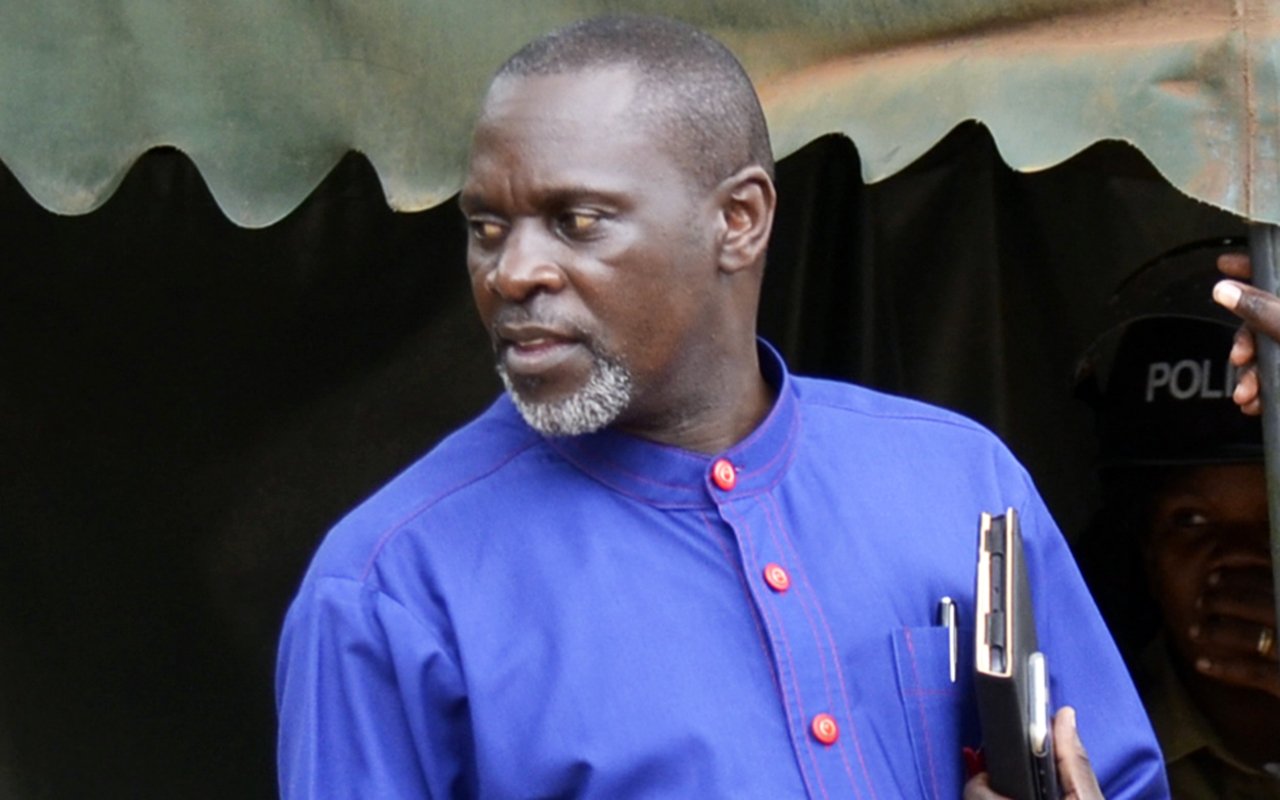Judge in Pistorius trial rises from a tea girl to stardom

Thokozile Masipa, to right of door in red cape, and her advocates examine the bullet-riddled toilet door in the build up to the Oscar Pistorius murder trial in South Africa. courtesy photo.
What you need to know:
Rising star. Judge Thokozile Masipa is described as part of a generation of people who “struggled under apartheid”, and who realised that “your life is not simply about career and ambition, but making your country a better one.
Thokozile Masipa story is that of obscurity to stardom, from a small two bedroomed house, where she doubled as watch girl looking out for the police as her grandparents brewed beer to be able to put food on the table, she has come a long way to be the second black woman judge in South Africa.
Born in 1947 in a family of 10 children; five of whom did not make it to adulthood, Judge Thokozile Masipa, the judge in Oscar Pistorius’ murder trial, grew up in Orlando West district of Soweto not far from Nelson Winnie and Mandela’s home in Soweto.
She went to Immaculata High School in Alaxandra. As a young girl, Masipa was not into social life in her teenage years but buried her time in books according to her own admission. “I was not a great socialiser; I would be buried in my books.”
Her parents’ inability to pay for her university education did not kill her desire for education. She worked as a clerk, messenger and tea girl to raise money for her university education.
At the inspiration of her teaching mother, her first bachelor’s degree was in Social works in 1974 before joining the University of South Africa where she attained her LLB in 1990, and admitted as an advocate the following year.
As a social worker before joining law school, Judge Thokozile Masipa worked as a correspondent for World newspaper reporting on the violent struggle against apartheid including the time of Steve Biko’s murder in 1977.
Unfortunately, the newspaper was shut down that same year and she went on to become women’s editor of the Post newspaper, where she wrote about schools, education and labour conditions for domestic workers.
At the age of 29 she was among those arrested and imprisoned following a march in support of press freedom.
During the prison time one day, Masipa was forced to sleep on concrete floor for disobeying orders to clean the filthy, overflowing lavatories inside their cell. That experience helped cement her passion for human rights, and her hatred of injustice.
By 1980, she started her law course lasting up to 10 years, while working as a full-time journalist. By then she was married to a tax consultant and got two children. She was admitted as an advocate in 1991.
“She was a pupil of mine in 1991. She passed with flying colours. She was very, very hard working and diligent - a very private, decent person who takes her work seriously,” said lawyer Mannie Witz.
In 1998, Justice Masipa was appointed as a judge in the Transvaal Province Division (as it was then known) of the High Court of South Africa, a development which made her the second black woman to be appointed as a judge in the High Court after Lucy Mailula.
Mailula had been appointed to the Transvaal Provincial Division of the Supreme Court (as it was then known) in 1995.
Masipa has also served in Gauteng’s consumer court tribunal, the Estate Agents Board, and the Electoral Court of South Africa.
The 66-year-old has come a long way breaking through a racial barrier, “I had a real experience of what life was like when you were black and you were not educated. I’d seen these White... girls working on the offices, typing, doing all kinds of things,” she said.
At one point she felt further education was worthless that she would never break through the racial barriers.
Judge Thokozile Masipa has earned a reputation of being unafraid of controversy, intelligent and tough. When she was appointed to handle the Oscar Pistorius case the public looked back at some of her notable judgments, looking for clues.
Among those judgments included the one of last year when she sentenced a serial rapist to 252 years in prison saying: “The worst in my view is that he attacked and raped the victims in their own homes where they thought they were safe.”
Earlier on she had sentenced Freddy Mashamba, a police inspector, to life in prison for murdering his wife in 2009.
The Pistorious case
The courts service insists that her allocation to the trial was a routine rotation, and had nothing to do with her past activism or present case expertise.
From her Courtroom GD, where Oscar Pistorius has been on trial since March 2014, Judge Thokozile Masipa has seemed a distant, silent, diminutive figure as the drama unfolds before her.
When she started hearing the case her critics were quick to interpret her detachment as a sign that she’s either out of her depth, or overly intimidated by the television cameras broadcasting her every gesture to a global audience.
“The judge is clearly inhibited [by the cameras] in this case, as regards interventions,” concluded the prominent South African lawyer, Jeremy Gauntlett.
And yet, as this long trial coils to its conclusion, Judge Masipa’s quiet demeanour - in stark contrast to the theatrics and tears, which have dominated the courtroom floor - have earned her growing respect and admiration.
“I feel very proud. I like her composure. She’s centred. I think it’s very important for the judge to somehow bring an element of poise into the proceedings,” said Albie Sachs, a former Constitutional Court judge and crucial figure in South Africa’s struggle to end white-minority rule.
She is part of a generation of people who “struggled under apartheid”, and who realised that “your life is not simply about career and ambition, but making your country a better one”, said Justice Sachs.
“Peers respect her. She gives everybody a fair hearing. She’s not intrusive, but can be firm when she needs to be,” said Mr Witz.
Despite the growing admiration of the former tea girl Judge Thokozile Masipa took great efforts to hide any semblance of emotion during the six-month trial of the Paralympic athlete.
Throughout the trial she hardly intervened to give both the prosecution and the defence chance to make exhaustive submissions.
Through the six months trial, the judge is said to have kept her thoughts on Pistorius’ actions to herself – sharing them with no one in the court, and being driven alone from her Midrand house to the courtroom in Pretoria every day.
Her interventions may have been rare - but each has revealed a meticulous attention to detail and fairness, and obvious desire to give prosecution and defence an exhaustive opportunity to present their cases.
However, it has not stopped her story being seized upon by observers of the case – and held up as a mirror into the soul of modern South Africa. The fate of a wealthy Afrikaans superstar - Pistorious - now lies in the hands of a township-born black woman – but one who believes in justice, whatever that may be.
As for her own future, and that of South Africa, Judge Masipa offers this: “I think we’re going somewhere. We still have a long way to go, obviously, but... we’re making a difference. It’s a tough place to be, because for a long time it was only men who sat here.
“And in our culture it’s even tougher because some men are just not used to seeing women giving orders. So it’s tough, but, you know, one gets used to it.”
In a 2003 interview with the Judicial Service Commission, Masipa supported greater transparency and interaction with the media to aid the public’s understanding of the judicial process.
Thokozile Matilda Masipa, 66, has come a long way from her humble origins in a black township outside Johannesburg where she worked as a clerk, a messenger and a tea girl.
ABOUT THE CASE
Judge Thokozile Masipa has ruled that Olympic athlete Oscar Pistorius did not murder his girlfriend Reeva Steenkamp on Valentines’ Day 2013.
But she said she would deliver her verdict on a lesser charge, culpable homicide, on Friday.
The state argued that Mr Pistorius had had an argument with Ms Steenkamp, after which he deliberately shot her dead.
The judge ruled this had not been proved, as there was only circumstantial evidence of an argument - uncorroborated witnesses’ statements.
She also dismissed witnesses who said they had heard Ms Steenkamp scream before the shots were fired, or before the final shot.
The judge found that he consistently said he had fired in the belief there was an intruder and she had no reason to disbelieve him.
About Pistorious
Oscar Leonard Carl Pistorius born November 22, 1986) is a South African sprint runner. Although both of Pistorius’ legs were amputated below the knee when he was 11 months old, he competes in events for single below-knee amputees and for able-bodied athletes. At the 2011 World Championships, Pistorius became the first amputee to win an able-bodied world track medal. At the 2012 Summer Olympics, Pistorius became the first double leg amputee to participate in the Olympics when he entered the men’s 400 metres and 4 × 400 metres relay races.




